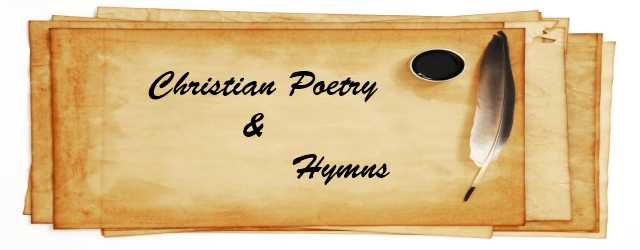Christian Poetry
Poetry that is greatly influenced by Christian themes and teaching is by no means a literary invention of the last few hundred years. Although the poets that many of us hold in high regard came to a degree of prominence and popularity within the last 300 years or so, the history of Christian poetry goes back way beyond that and into what we might call Bible times. Indeed, are not five books of the inspired Scriptures classed as poetical books! These are Job, Psalms, Proverbs, Song of Solomon and Ecclesiastes.
The aim however of this element of our website is not to seek to write about the history of Christian poetry, but rather to introduce some of the poems written by those we might be more familiar with. Whilst some of these gave expression in what they wrote to their innermost thought concerning God; His being, holy character, love, mercy and grace, others also used the poetical form to speak about national and social issues.
Many of the poems by people such as William Cowper, John Newton, Charles Wesley, Isaac Watts, Joseph Hart, Francis Ridley Havergal, Fanny Crosby, and a host of others as well, were not originally written to be sung. It was later, following the original composition of the piece that the poems were set to music, and in that form have become so familiar to us today.
Christian Hymns
In addressing the subject of Christian hymns and Spiritual songs we are inevitably drawn to two passages of Scripture:
Speaking to yourselves in psalms and hymns and spiritual songs, singing and making melody in your heart to the Lord…. Ephesians 5:19
Let the word of Christ dwell in you richly in all wisdom; teaching and admonishing one another in psalms and spiritual songs, singing with grace in your hearts to the Lord. Colossians 3:16
When so much of church music today is focussed on us, our emotions, and our feelings, it is needful to be reminded that it is the Lord Himself who should be the object of our worship. Thus both the above texts point us to the essential truth that it is to Him that we sing, how important then should be the spiritual content of our praises and thanksgiving.
In the context of our church services choosing the hymns that we sing is of crucial importance. Many preachers find it helpful to select hymns that make some contribution to the theme of their sermon. Some may even admit to the fact that the actual choosing of hymns takes a great deal of their time, as they also endeavour to ensure that the hymns chosen are rooted in Scripture, and are theologically sound. In fact someone once said that ‘the only theology that most people learn is contained in the hymns they sing!’
Favourite Hymns & Poems
Do we have favourite hymns or poems? Why yes, of course we do. Do we have favourite hymn-writers or poets? The answer again is likely yes. Many wonderful hymns were written after deep personal experience of God’s gracious dealings with those involved – take for instance William Cowper’s – ‘God moves in a mysterious way His wonders to perform’, or John Newton’s – ‘Amazing Grace.’ A wonderful example of a great ‘doctrinal’ piece which is full of meaning, and a personal favourite of this writer is ‘A debtor to mercy alone’, written by Augustus Montague Toplady, a godly man, who sought to live near to his God. The tone of some of the interchanges between John Wesley and himself may cause us to be somewhat saddened, but that he was a man of God, a true soldier of the cross and faithful in his calling is beyond doubt. Bishop Ryle wrote of his high regard for him (see J. C. Ryle’s short biography of Toplady).
